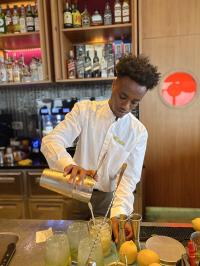
Be sure to also check out our round-up of Israeli cocktail recipes.
Just a few years ago, local press on Israeli bars considered the establishments followers rather than leaders. This was even the case if they had top-tier spirits on hand along with fresh fruits, vegetables, and herbs to play with. As time went on, enterprising bartenders realized that Israel has everything they need to make its cocktail space memorable and singular. They just needed to harness that power.
Moving From Follower to Leader
“High-quality alcoholic drinks have been available here for twenty years…[but] bartenders will tell you that even when we finally learned to drink alcohol, most men just went for whiskey, arak, and vodka, while the women preferred sweet cocktails,” Haaretz’s Rotem Maimon observed in 2015. “In truth, not much has changed.”
In her 2021 story about Tel Aviv’s cocktail scene evolution, web magazine Tablet’s Flora Tsapovsky noted that 20 years ago, a cocktail in a Tel Aviv bar would often be a, “neon-hued, sugary creation that was geographically ambiguous.”
In the last few years, especially since the pandemic, the winds of change have been strong, driving forward Israel’s tech sector, sustainability trends, and culinary innovation. The cocktail movement has been propelled forward in a similar fashion. During 2020 and 2021, many top tourism sites worked behind the scenes to take the visitor experience to the next level with artificial intelligence, virtual reality, and other "gee-whiz" elements. Restaurants known for their innovative bar programs, including Jerusalem’s Adom, Tel Aviv’s Manta Ray, and the bars at Isrotel properties, tightened up their menus and focused on recipes showcasing local ingredients at their best.
“There are so many interesting things going on with local spirits and cocktail ingredients right now,” Elad Shoham, the beverage director for R2M Group, which owns Hotel Montefiore (widely cited as one of the city’s most influential boutique hotels among locals and visitors), told Tablet’s Tsapovsky, solidifying her arguments about Israel’s cocktail evolution. “While already known for its wine industry, whiskey initiatives, and craft beer, Israel had been relying on imports for all things mixology—the art of the cocktail. Now, partially inspired by the pandemic, locally made shrubs, bitters, tonics, vermouth, and liquors are becoming increasingly important. The local trend has been twofold: leaning on ingredients made in the country and on flavor profiles that are distinctly Israeli.”
Put more succinctly, Julian Bella Robins, manager of The Common Bar at the recently-opened David Kempinski Hotel in Tel Aviv, assesses, “Maybe it’s driven from a monetary perspective, or maybe the Israeli culture that is fast paced, intense, and demanding —we are [a] startup nation.” He then notes that the prevailing cocktail trends at The Common Bar include, “delicate and minimal garnishes, tequila cocktails, low-abv and non-alcohol cocktails, as well as single-malt cocktails. Plus exploring citrus alternatives, like cordials and ‘super (food) juices.’”
"New" & "Local" Are Key
Israeli bartenders in Jerusalem, Tel Aviv, and throughout the country understand that in today’s market, it’s not enough to merely follow common sense “cocktail movement” rules of balancing the right amounts of ingredients and high-end spirits, local and otherwise. There’s a need to be a step ahead when taking greater advantage of Israeli-grown raw materials with a specific terroir, ensuring even the simplest, most familiar cocktail will be a whole different experience than something comparable elsewhere.
“Content is king, and in the hyper competitive Israeli restaurant business, little is more challenging than finding a way to offer new and enticing content in terms of what customers drink and eat,” says Bennett Kaplan, company spokesman for Thinker’s Distillery and husband of Yael Kaplan, who co-founded Thinkers Distillery in Jerusalem in 2021, a short jaunt from the Mahane Yehuda Market. “Improved cocktail menus, while always necessary, no longer have the attention-getting power they once did. After all, we’re some 25 years into the cocktail renaissance and things have a way of becoming prematurely stale in hot cities like Tel Aviv.”
Thinkers’ Distillery offers a number of spirits:
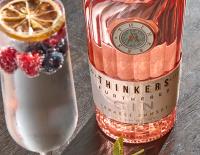
- Jerusalem Dry: a London dry-style gin
- Israeli Sunset: a gin distilled with rose petals and red fruits
- Dew of B'Dolah: a bourbon made from a wheated mash bill of the highest quality kosher food grain mashed, fermented, distilled and barreled in the U.S.
- Vodkas
- 40/60 Vodka and 52/48 Vodka
Kaplan says he’s proud of the fact that Thinkers is one of several small Israeli producers giving some of the choicer restaurants in competitive markets like Tel Aviv and Jerusalem a chance to get a customer’s attention like few things have in recent memory. Kaplan points to an on-premise, five-event collaboration with Tel Aviv-based Thai restaurant Kab Kem. “We provide our bar cart, mixologist, and brand ambassador,” he details. “We also designed the cocktail menu. While Kab Kem’s regular bar operated, 90% of the drinks poured usually ended up being Thinkers' cocktails. While Kab Kem usually offers one special dish for the evening off the standard menu, the evening turns into an elegant introduction of the distillery because the focus revolved around the two most powerful marketing words in Israel today: ‘new’ and ‘local.’"
According to Kaplan, “phase 2” of the collaboration changes gears from a ‘first-look’ for customers to a ‘deep-dive.’ Here, the Thinkers team works with Kab Kem’s chefs to produce cocktails that match the flavors of the dishes to allow the customer an opportunity to examine the spirits in far greater depth.
“Both of these have been so popular that we’ve got a waiting list of restaurants that want to have their own Thinker’s evening,” says Kaplan, who notes that all of the restaurant collaborators successfully pre-reserved all their seating, adding an extra-exclusivity factor. “Of course, everything is in the details, but this is how we have seen some of Israel’s top restaurants use our brand to break through the noise barrier.”
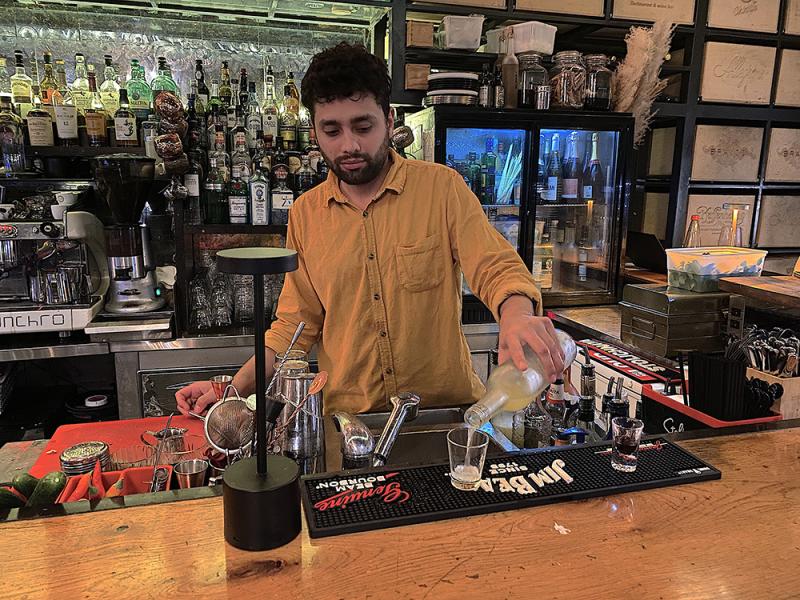
For those restaurants focused on wine, such as Jerusalem’s Adom and Tel Aviv’s North Abraxas (whose owner-chef, Eyal Shani, has global reach with various branches of his restaurant concepts open in the U.S., Europe, and Asia), the same factors of uniqueness and location apply. It’s important for the restaurants to have “a sense of place and a transparency” in how the menus are presented.
“Like Eyal Shani’s food, it’s not about manipulation or extraction, its about the purity of flavors, and the wine has to mirror the food,” says Shani spokesperson Nico J Snyman. “North Abraxas has been grounded in the wine from the start. Focus on the product, smaller producers, less intervention, no additives. Shani has the same philosophy he has for food and applies it to wine.”
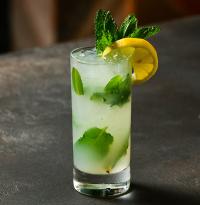
According to Snyman, Shani’s wine selections for North Abraxas’ are based upon how well they harmonize with his recipes and their approachability among all customers. Although a good number are from Burgundy, all selections, “have to have the memory of where it’s from” in the terroir. The limited number of cocktails, meanwhile, are decidedly not sweet, so the flavor profiles Shani creates shine through. Case in point: The Arak Mojito, replacing rum with the more traditional Middle Eastern spirit.
Trends & Influences from Abroad
Robbins points out that while Tel Aviv has emerged as Israel’s “unofficial vegan and sustainability capital,” customers coming in from both across the street and across the globe not only want to embrace trends, but also assess if those trends are being executed well. Although it can be useful for those in an industry to compare how they’re doing against their counterparts elsewhere, they need to be realistic about what’s best for their business in the immediate.
“Our industry definitely looks towards the U.S. market to compare and measure ourselves,” explains Robbins. “There are goals like DEI (diversity, equity and inclusion, providing a good workplace to all workers) given a nudge due to its relevance in the U.S. market. Exploring the ‘Israeli’ kitchen and its eclectic background is another. I feel how these goals compare to the U.S. market is necessity versus trend. Right now, in the U.S., all these goals are trend-based, and with research and education we see the long-term benefits and why they make sense. But here, the goal needs to see an almost immediate impact or it’s deemed not necessary. This is felt by consumers, managers, and business owners alike.”
Telling a Story
Avri Hatuel, regional bar manager at Isrotel Hotels, leads development of cocktail recipes and cocktails for the hotels' properties across Israel. He notes that what makes the overall program challenging but creatively satisfying is ensuring every cocktail has a story to tell.
“A good story is something to write home about,” explains Avri. “Dramatic presentation is key in this day and age, [but] it could be visual, aromatic, or connect to the story in some interesting way. Although a good drink will always be a good drink, storytelling is key as it connects [the hotel’s] location with either the [property’s] theme, the local terroir, or other stories about the place that will keep the customer interested. We use local spirits whenever we can, and our wine menu is almost all local, with a few champagnes to make the exception."
For one of the hotel’s Italian-themed restaurants, for example, the bar kitchen prepares a housemade limoncello (“or any other citrus-related cello for that matter”) out of discarded citrus husks leftover in the kitchen as well as from citrus used for decoration in the hotel. While the creation is a sustainable, zero-waste product, its raw materials are from Isreal. Given its popularity with international and local guests, they are welcome to buy a bottle or ask for a recipe to make at home.
“The bar program is built in a very flexible way, allowing us to swap ingredients as the season changes, yet still keeping the essence of the drink intact as the summer heat gives way to winter rains,” Avri continues, sharing that bar and restaurant managers in the States can gain self-reliance in the means of production of liqueurs, syrups, and adjusting pantries to seasonal menus. “It also helps reduce food waste as we use fresh produce and use whatever is in stock."
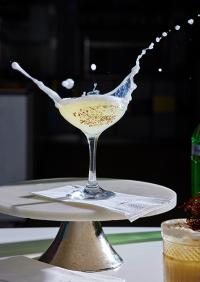
Avri also says that team flexibility is key to the properties' success, "Every team member trains on everything from bar preps to table service as we don’t use terms like waiter, bartender, manager, or busboy. We are all hosts, and every team member is cross training on every role in the team."
Israel may be a small market, but as its innovators have proven in other industries, applying problem-solving skills and finding new ways to use the resources already available can pay off and lead to better, more inspiring products.
“I believe what American bar and restaurant managers can learn from the Israeli market is about how to get creative and pivot,” says Robbins. “We’re a relatively small market with limited resources, comparatively, and I am proud to say that in Israel we’ve used this as an opportunity to get creative. Using seasonal and local products comes naturally; it is much more than a trend, for example. And when something just isn’t available, even to high-end resorts, we collaborate. This means a lot of cross-team collaboration between the bar, kitchen, and pastry teams, and front of house and back of house. We end up learning so much from each other. It’s a challenge that propels us forward and creates stronger, more knowledgeable teams.”
Plan to Attend or Participate in Bar & Restaurant Expo, March 27-29, 2023
To learn about the latest trends, issues and hot topics, and to experience and taste the best products within the bar, restaurant and hospitality industry, plan to attend Bar & Restaurant Expo, March 27-29, 2023 in Las Vegas. Visit BarandRestaurantExpo.com.
To book your sponsorship or exhibit space at Bar & Restaurant Expo, contact:
Veronica Gonnello (for companies A to G) e: [email protected] p: 212-895-8244
Tim Schultz (for companies H to Q) e: [email protected] p: 917-258-8589
Fadi Alsayegh (for companies R to Z) e: [email protected] p: 917-258-5174
Also, be sure to follow Bar & Restaurant on Facebook and Instagram for all the latest industry news and trends.
